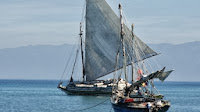- that low value freight is still moved by heavily laden sail boats (charcoal) or bullock trains (sugar cane), often with multiple wagons and multiple animals.
- that the name "Obama" keeps showing up.

Evens went on to explain that used tee shirts are ofen called, "Kennedys" because John Fitzgerald Kennedy was President when Americans started shipping used clothing to Haiti.
- that Haitians work very long hours, many more days a week than workers in America, who are regarded as hard working. Our guesthouse staff are pleased to be employed since so many of their family and friends are unemployed, even though they may work six days a week, twelve hours a day.

- that the local health care system can be quite efficient. When we took one of our staff into a Leogane clinic because we thought she was suffering from heat exhaustion, the doctor gave her a prescription for a number of possible ailments.
- that we can actually get used to the heat. We recently found ourselves sitting at dinner without turning on the fan. Note that this is probably the hottest part of the day in the guesthouse! We have a new definition of "hot and sticky."
- that plain spaghetti with ketchup (it IS called "tomato sauce" in Australia) sprinkled with raw onions and raw green peppers can be delicious.
I remember when I first saw this served in Blanchard right after the earthquake. I figured it was a special offering because food stuffs were at a premium at that time. And, they served a LOT of raw onions.
Here we're a bit more conservative with the onions. Note to potential guests - this is the "staff meal" at noon - not to worry...
- that as we work on understanding the detailed costs of running the guesthouse, and look for process improvement opportunities, we're struck with the mix of global and local costs. It SHOULD be cheap to run this place, but it is not always. Some costs, e.g. energy and water, are more than in the US.
- that I'm still blogging, even though blogspot is pretty quirky and tries my patience. Right now, for example, I can't get the menu to size and add captions to these photos. The one above, with the large mango tree growing in the middle of the restaurant, serves wonderful seafood at very reasonable prices. Below, as they fill the drinking water bottles, they charge us $.15, where as in Apex we pay a fraction of a cent.



I think if you went to a place in Apex that filled up drinking bottles it would probably cost you a lot more than $.15 per bottle! The municipal water system is another story of course. It really is good to be reminded how much we take for granted having reliable water, sewer, and electrical power.
ReplyDeleteThanks for blogging. I'm enjoying keeping up with your adventures and am glad you know you are Jeff are doing well. The details and insights you've shared are fascinating too!
ReplyDelete